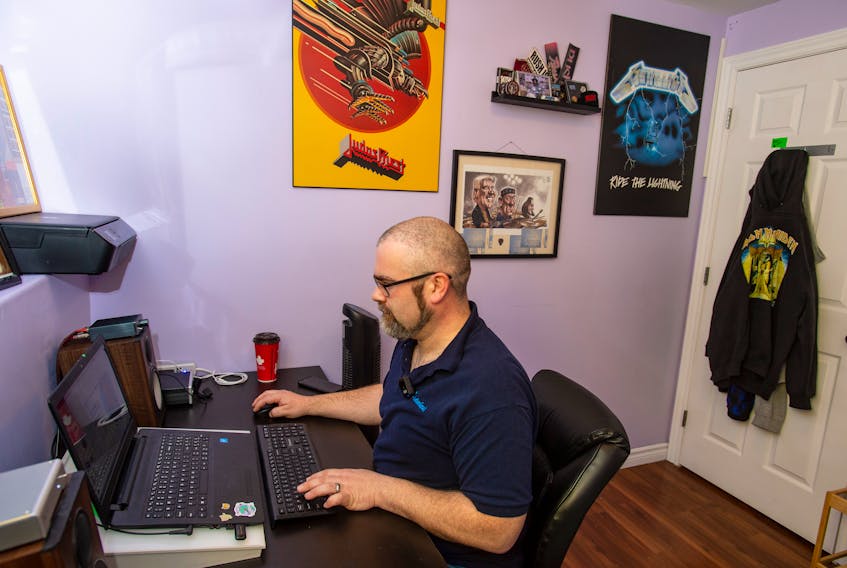Apart from making their own coffee in the morning, and not being able to conveniently get a shawarma for lunch, working from home has not been much of a trial for many workers.
No traffic, no scraping the windshield, hardly any ironing.
But 10 months in, this new reality has presented some unforeseen challenges to employers who still need productivity.
PRIVATE SECTOR
“Some people, when things get back to normal, so to speak, would love to do two or three days at home and the remainder in the office.”
- Kyle Davis, communications co-ordinator for Admiral.
The international company Admiral Insurance has 394 employees in Halifax, all of whom started working from home when the state of emergency was declared in March. Many are still at home, but about 180 returned to the office in May.
“And those were mainly folks who had some IT challenges at home, who perhaps wanted to be in the office for that social component,” said Kyle Davis, communications co-ordinator for Admiral.
“So, that 180 was kind of what we had maxed out at and then fall comes around, the second wave opened up, so we told folks, look, no one is being forced to come into the office. We basically gave them the option of whether they wanted to return to working from home, providing we could address the majority of the IT challenges we had seen in the spring.”
Admiral did not offer telecommuting as an option before the pandemic. Davis said there were some bumps in the road initially, but it’s going much more smoothly.
“Universally, across the board, is everyone wanting to continue to work from home? No. Do we see that there has been an uptick in satisfaction rates from people working at home . . . absolutely,” he said.
“Some people, when things get back to normal, so to speak, would love to do two or three days at home and the remainder in the office.”
Not everyone has a home office, but most everyone has a kitchen table and lots of those are doing desk duty. Conscious of the fact that a bad back means absenteeism, employers are paying more attention than usual to ergonomics.
“We have a two-pronged approach to this. Our managers are in frequent contact with our agents via Skype or Zoom calls,” Davis said.
“And these calls aren’t really done on the basis of assessing their ergonomic setup, but invariably when you’re doing a video call you get a sense of how a person is working. Are they in the kitchen with last night’s supper behind them, or are they in a formal office area? So, we do get a good sense of how our agents are faring.”
Admiral also worked out a bulk price for office equipment with Staples, its supplier, and gave each employee $85 to go toward the purchase of a chair or other equipment.
With mental health of workers in mind, Admiral gave all their employees world-wide five additional days off at the end of the year. And when the company’s CEO recently retired, he gave every employee 1,000 pounds (a little over $1,700) out of his own pocket, which means he's a) generous, and b) rich.
“Things like that allow us to carve out a positive reputation for ourselves,” said Davis.
“We have introduced some additional things that provide further monetary support to employees working from home, outside of an immediate bump in salary or hourly rate. We have something called a personal spending account, from which employees can claim for a variety of things that normally wouldn’t be covered under our Blue Cross plan. For example, it gives them $500 a year and they can claim things like a pool league membership or hockey equipment, things like that. It covers a wide variety of categories. And in early summer, we expanded on this to allow employees to now claim $500 through Blue Cross for expenses that they incurred through working from home, things like power costs, internet costs, things like that.”
Admiral recently supplied the appropriate tax forms and communicated to employees the steps involved in claiming their home as a workplace.
UTILITY
At Emera, there are no plans to have people working at home permanently.
“No, not at all,” said Mike Roberts, the chief HR officer.
“We feel that we are better together. We’ve certainly learned a lot from the last 10 months, working from home, and that will change the way we work forever. But when it is safe, when the guidance from the health experts says so, we expect to be back together in one location.”
Of Emera’s 7,000 employees in Canada, the U.S. and the Caribbean, 2,400 work in Nova Scotia. About half have been working at home since March.
“Ergonomics is an important component of health and safety, especially for the significant part of our workforce that are in offices and sitting in front of computers at their desk all day. So, ergonomics was front and centre,” Roberts said.
“We’ve reminded people working from home, ask them to check on their work space at home, check on their chair, which is really important and the positioning of monitors and we provide them guidance. In some cases, we’ve delivered chairs to home to ensure they have the right setup to do the work they do.”
Roberts said his department has not seen a significant change in the number of chiropractic claims made to its insurer. And most employees say they are just as productive at home, and the results seem to bear that out.
“By all accounts, people are finding ways to get their work done from their home location,” he said.
“The service we provide, electricity, is an essential service, so it’s balancing all of that, making sure we provide the service for customers but doing it in a way that’s safe for our employees.”
GOVERNMENT
The vast majority of provincial public servants are back in their physical workspaces, with many never leaving at all, says Chrissy Matheson, spokeswoman for the Nova Scotia Public Service Commission.
“Currently, over 80 per cent of employees are in their physical workplaces on a full-time or rotational basis, while others continue their regular work remotely for a variety of reasons, such as health issues,” Matheson said in an emailed statement.
She also said that employees who have been working remotely have their physical health supported by a number of tools:
• Written and webinar information from occupational therapists on ways to set up a home office in an ergonomic way.
• The ability to take office equipment home – adjustable chairs, monitors, keyboards, etc.
• Local occupational therapists providing virtual ergonomic assessments when needed.
• Providing managers with the tools to help employees identify and control hazards while working from home.
“Regarding tax forms for people who want to declare their home a workplace, the federal government has indicated it will allow expense claims up to $400 for employees working from home due to COVID-19, based on specific criteria,” said Matheson.
“This is being finalized with more details to be released. As a result, and in keeping with the terms and conditions of employment for civil servants, the province will not be issuing Form T2200 to employees.”









